The Intel Core i5-7600K (91W) Review: The More Amenable Mainstream Performer
by Ian Cutress on January 3, 2017 12:01 PM ESTLegacy and Synthetic Tests
At AnandTech, I’ve taken somewhat of a dim view to pure synthetic tests, as they fail to be relatable. Nonetheless, our benchmark database spans to a time when that is all we had! We take a few of these tests for a pin with the latest hardware.
Cinebench R10
The R10 version of Cinebench is one of our oldest benchmarks, with data going back more than a few generations. The benchmark is similar to that of the newest R15 version, albeit with a simpler render target and a different strategy for multithreading.
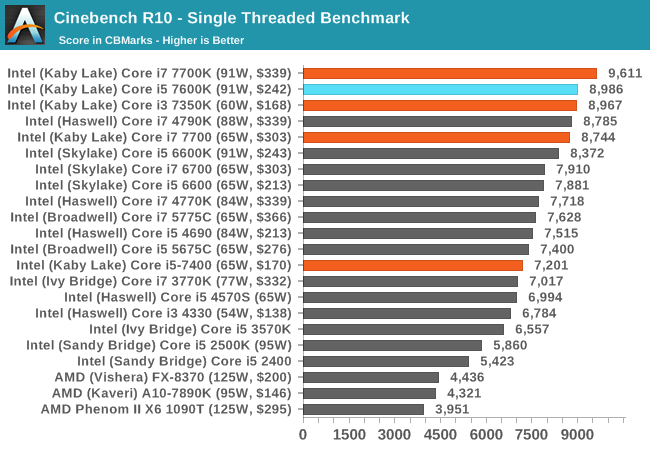
With high frequency in tow, the Core i5-7600K matches that of the previous generation i7-6700K, and goes above the Devil’s Canyon i7 as well.
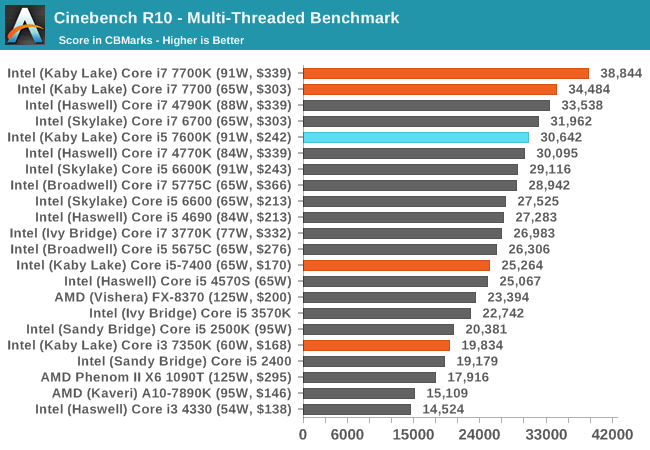
When more threads come to play, the Core i5-7600K sits atop all the other i5 parts, and because hyperthreads have little effect here, the combination of IPC and frequency pushes the Core i5-7600K above previous top performers such as the Core i7-4770K.
Cinebench R11.5
CB11.5 has been popular for many years as a performance test, using easy to read and compare numbers that aren’t in the 1000s. We run the benchmark in an automated fashion three times in single-thread and multi-thread mode and take the average of the results.
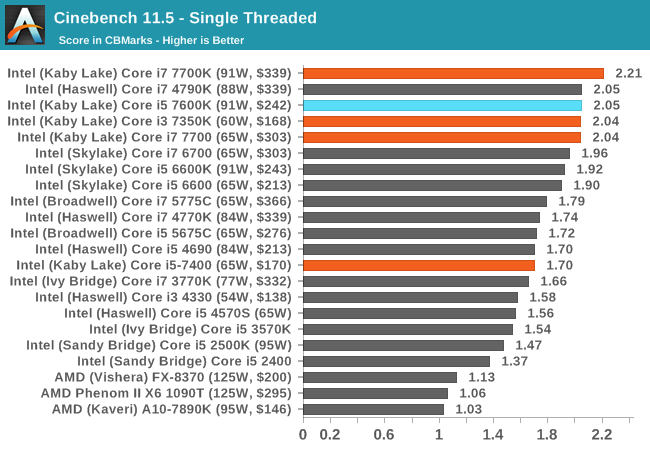
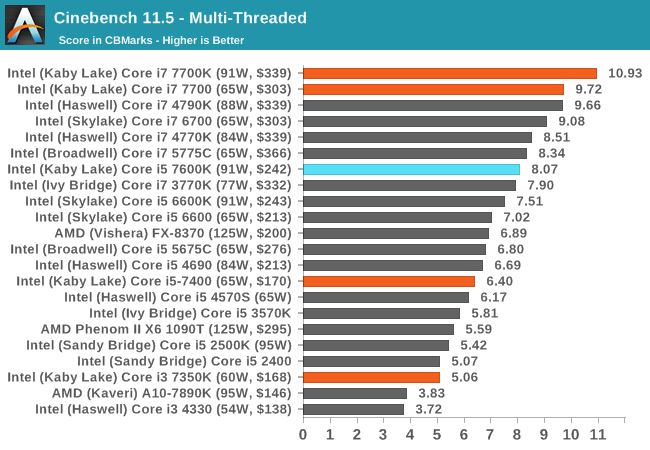
Out of the box the i5-7600K hits above a 2.00 on the single threaded test and above 8.00 on the multithreaded test, showing that the scaling with cores on CB11.5 is very reasonable.
7-zip
As an open source compression/decompression tool, 7-zip is easy to test and features a built-in benchmark to measure performance. As a utility, similar to WinRAR, high thread counts, frequency and UPC typically win the day here.
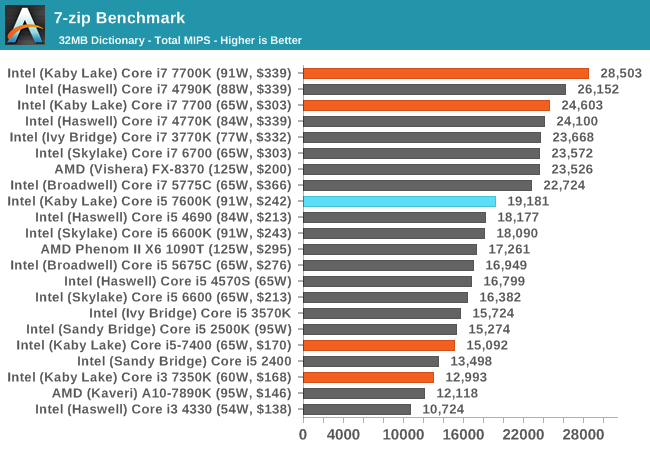
The Core i7-7700K shows the benefits of frequency over a stock i7-6700K, however at the same frequency they perform roughly the same as expected.
POV-Ray
Ray-tracing is a typical multithreaded test, with each ray being a potential thread in its own right ensuring that a workload can scale in complexity easily. This lends itself to cores, frequency and IPC: the more, the better.
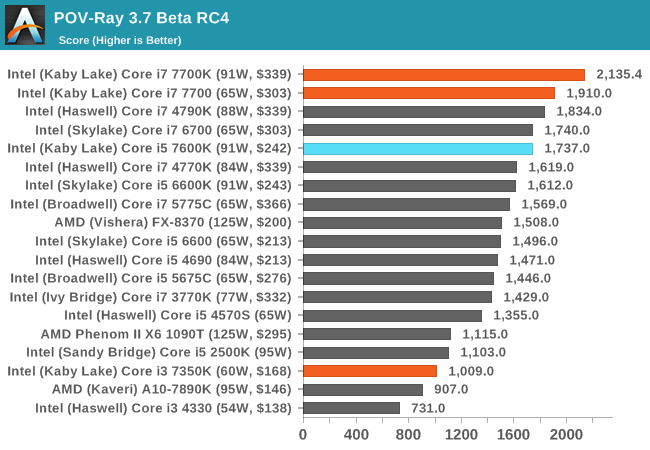
AES via TrueCrypt
Despite TrueCrypt no longer being maintained, the final version incorporates a good test to measure different encryption methodologies as well as encryption combinations. When TrueCrypt was in full swing, the introduction of AES accelerated hardware dialed the performance up a notch, however most of the processors (save the Pentiums/Celerons) now support this and get good speed. The built-in TrueCrypt test does a mass encryption on in-memory data, giving results in GB/s.
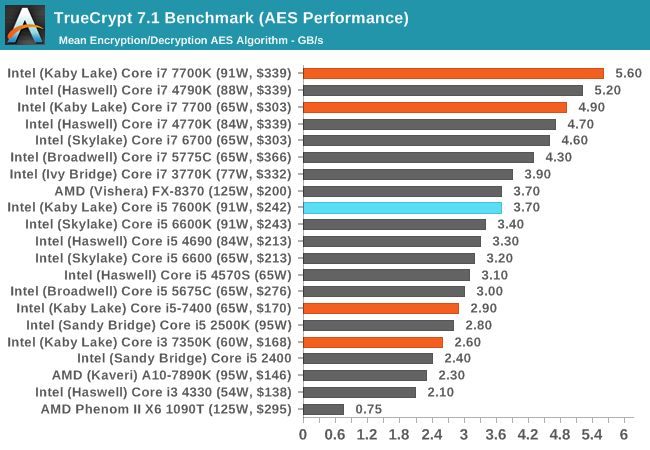










70 Comments
View All Comments
Gastec - Wednesday, January 11, 2017 - link
I remember that when Windows XP came out, more than 15 years ago, eveybody was crying out loud (some hysterically) that Windows 98 is waaay better and they will never upgrade to XP.But enough about operating systems, that discussion is irrelevant. I'm more interested in learning about the things (voices?) that YOU HEAR and record :)
serpretetsky - Tuesday, January 3, 2017 - link
Maybe I went over the article too fast, is there something specific about this chip to windows 10?nico_mach - Tuesday, January 3, 2017 - link
Speedstep is unique to Windows 10.Bullwinkle J Moose - Tuesday, January 3, 2017 - link
probably not but do any of the motherboards support IDE ?Does the chip itself have XP drivers?
Probably not
Waste of money
Murloc - Tuesday, January 3, 2017 - link
if you don't like windows you can use linux.With XP you're not getting the most recent versions of directx anyway so you're probably not gaming on it, so what's the reason for sticking to windows?
doggface - Wednesday, January 4, 2017 - link
Seriously... Wow. Troll much.Bullwinkle J Moose - Wednesday, January 4, 2017 - link
neverShadow7037932 - Wednesday, January 4, 2017 - link
Loss of $500-1K from you is not a big deal for Intel or any other OEM.Outlander_04 - Tuesday, January 3, 2017 - link
Looks like intel are worried about Zen enough they have bumped up stock clocks .They have achieved that with out too much extra power consumption which is something I guess , but kaby lake is not a step forward
Murloc - Tuesday, January 3, 2017 - link
optimization is just that, why would we expect something more?